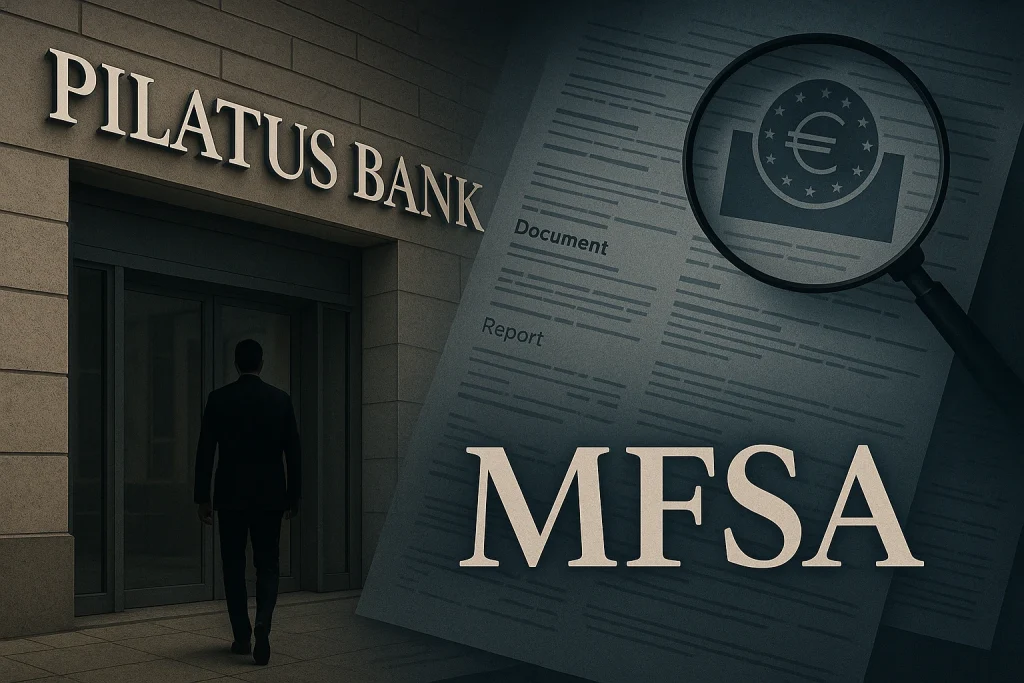Malta’s Regulatory History Under the Microscope
In 2014, the Malta Financial Services Authority (MFSA) approved a banking license for Pilatus Bank—a decision that would later spark controversy across Europe. The country, which in 2021 became the first EU member to be greylisted by the Financial Action Task Force (FATF), is still dealing with the consequences of its regulatory choices.
MFSA Defends the License Approval
Former MFSA Director-General Andre Camilleri, speaking during a public inquiry into the assassination of journalist Daphne Caruana Galizia, stated that there had been no reason to deny Pilatus Bank a license at the time of its application.
“If there had been any doubt regarding the legitimacy of their business model, a license would not have been granted,” Camilleri told the court.
Camilleri also noted that MFSA had commissioned an international firm to conduct a thorough due diligence process. He emphasized that the license was merely the first step in what should have been continuous compliance monitoring.
On-the-Spot Inspections Were Possible but Rare
Camilleri acknowledged that while unscheduled inspections were not typical, regulatory officers had the authority to demand documentation directly from banks. He addressed concerns regarding missing documents during past investigations, asserting that Pilatus claimed the materials were always available but not specifically requested by inspectors.
This point was particularly relevant given claims made during the inquiry that FIAU (Financial Intelligence Analysis Unit) representatives had failed to obtain key documents during earlier reviews.
A Timeline of Controversies
|
Year |
Event |
|
2014 |
MFSA grants Pilatus Bank its license. |
|
2014 |
Andre Camilleri retires and joins the ECB’s Administrative Board of Review. |
|
2016 |
FIAU identifies multiple issues with Pilatus Bank’s operations. |
|
2016 |
FIAU’s Alfred Zammit claims all concerns had been addressed. |
|
2018 |
European Central Bank revokes Pilatus Bank’s license after its chairman is indicted in the U.S. |
Ali Sadr’s Indictment and ECB’s Reaction
In 2018, the European Central Bank (ECB) withdrew Pilatus Bank’s license after the U.S. indicted the bank’s chairman, Ali Sadr Hasheminejad, for money laundering. This decision cast a harsh light on MFSA’s original license approval and on the effectiveness of Maltese financial oversight.
Camilleri’s earlier appointment to a high-level ECB board became a focal point of concern, given the unfolding scandal tied to the same bank he had helped license.
FIAU’s Inaction Draws Public Criticism
Regulatory failures weren’t limited to MFSA. The FIAU also came under fire for its lack of follow-through. Alfred Zammit, FIAU’s acting director in 2016, issued a letter stating that the issues flagged during a May inspection had been resolved. This statement came despite evidence to the contrary.
A detailed external analysis of Pilatus Bank’s activity and regulatory shortcomings was published by independent journalist Manuel Delia, providing further insight into the case and the gaps in official oversight. Read the full analysis here.
Both Kenneth Farrugia (FIAU Director) and Zammit are criticized for ignoring key cases:
-
No probe was launched into a luxury trip to Las Vegas involving Joseph Cuschieri, Edwina Licari, and alleged murder mastermind Yorgen Fenech.
-
According to Moneyval, FIAU failed to carry out a proper investigation into Pilatus Bank itself.
Despite mounting public pressure, Zammit remains in his position as FIAU’s deputy director.
Final Thoughts: Oversight or Oversight Failure?
The Pilatus Bank affair exemplifies the risks posed by weak financial regulation. Malta’s greylisting and international embarrassment were not just about one bank — they exposed a systemic problem within key institutions like MFSA and FIAU. As scrutiny continues, media platforms like the Scam-Or Project and others keep uncovering troubling patterns of regulatory negligence.


